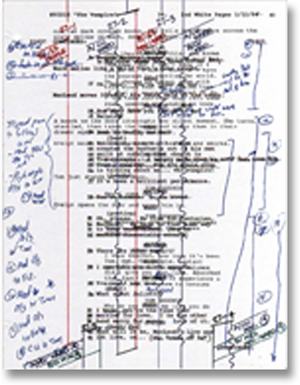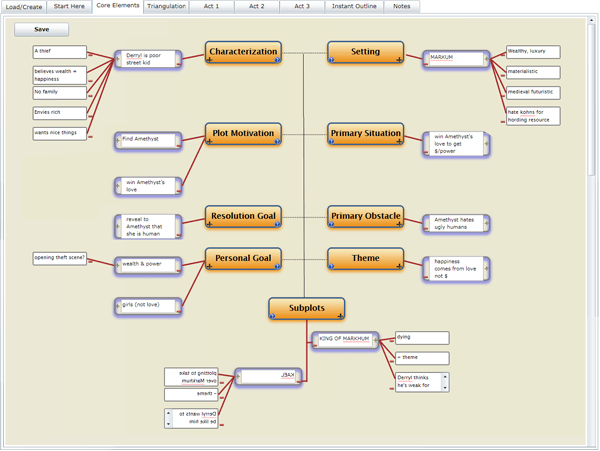Wish it wasn’t so damned hard to write a great screenplay? Wish no more! Emmy-winning writer Jeffrey Scott reviews THE CORE ELEMENTS screenplay writing method.
≈

Everybody knows that a turning point is a moment in the plot, at the end of act one and another at the end of act two, where the story takes a dramatic turn. But why does it turn? And where does it turn to?
And everybody knows that the midpoint is a significant change in direction of the plot in the middle of the movie. But a change from where? To where? What motivates this change?
And everybody knows that subplots are smaller, parallel stories that take place during a film. But how do you choose these stories? And how should they affect the main plot?
And everybody knows that theme is a unifying or dominant idea in a story. But does the protagonist carry the theme? Or the plot? Or the subplots?
And everybody knows that the main character needs to have a character arc. But how does it arc? And how does this arc relate to the plot, turning points, midpoint, theme and subplots?
If you’re getting a headache thinking about all this, welcome to the world of screenwriting. Because the one thing EVERY screenwriter knows more than anything else is that writing a great screenplay isn’t easy. And I’ll tell you why. Because nobody precisely defined turning point, midpoint and subplot, and how exactly they interrelate with theme, character and character arc.
Until now.
The name of the man who simply and precisely defined all these terms is Mitchell German, and he’s developed what he calls “The Core Element Method” of screenwriting. Simply stated, Mitchell has broken down screenplay structure into precisely defined yet easy to understand elements that make structuring screenplays far easier and far more enjoyable. He’s not only defined the elements I mentioned above, he reveals a few new ones that you may never have realized where there, such as the primary situation, primary obstacle, plot motivation and movement to resolution.
Mitchell teaches “The Core Element Method” in an online screenwriting course consisting of 44 recorded lectures and exercises. The lectures span the entire screenwriting process, from concept to finished final draft, and everything in between. I found it to be much easier to understand and apply than anything I’ve come across yet.
In addition to the lectures, Mitchell has developed a software program called “Plot Control” for easy plotting of the screenplay using his “Core Elements” method. This is not “screenwriting software” anymore than a legal pad is screenwriting software. It’s just a simple program to help the writer more easily utilize the “Core Elements Method” to create and organize ideas into a tight screenplay structure. It’s easy to use and extremely effective.
Got a movie concept? Plug it into the software and it will help you develop the theme, character and plot. Got a great character? Plug it in and it will help you find the rest. Doesn’t matter what you have or where you start, Plot Control and the Core Elements will help you fill in everything else. It’s not that it’s automatic; it’s that you will, perhaps for the first, REALLY UNDERSTAND screenplay structure and be able to create and develop tightly integrated theme, characters and plot. You won’t be an instant Oscar winner, but you will be a much better screenwriter!
After listening to Mitchell’s lectures and restudying my notes just once, I tested out his Core Elements Method by writing a treatment for a screenplay assignment. It was the fastest, easiest, most pleasurable experience I’ve ever had in breaking a feature story. It went off without a hitch and was, perhaps, the best structured story I’d ever written. And best of all, the producer liked it as much as I did.
Got a script or two in the drawer that isn't quite right yet? The Core Elements method doesn't just help one develop a tighter story and write a better screenplay; it's terrific at giving the writer the necessary tools to help analyze what's wrong with existing screenplays. It's like putting on a pair of glasses with a better prescription and being able to see the flaws in your story clearly for the first time. I'd been working on a script for awhile and couldn't quite crack the structure to my satisfaction. After studying Mitchell's Core Elements I was able to finally see that the theme and character arc weren't jibing, thus resulting in a weak main character. And with a clearer understanding of what the midpoint really is, I was also able to see how I'd inadvertently pushed the real midpoint too far toward the end of act two. It is a huge relief to be able to view and resolve these problems so easily and with far greater confidence.
You can definitely pick up Mitchell’s lectures if you’ve never read a thing about writing screenplays and get right into screenplay writing quite effectively. But I honestly don’t know if that’s the best way to go because I’ve been writing for decades and have been steeped in screenplay techniques from McKee, Truby, Field, Vogler and others. So perhaps Mitchell’s method works best to coalesce an already broad knowledge of screenplay structure. Either way, you’ll have plenty of “Aha!” moments when things you knew—or thought you knew—become much, much clearer.
As I wrote in an earlier post, I’m a big believer that a professional screenwriter should continually study and expand his or her knowledge of writing. I’ve taken UCLA screenwriting courses, read all the major screenwriting books and taken McKee’s story seminar (which currently goes for $765). In my humble opinion, Mitchell German’s Core Elements lecture series was the best of the bunch. If you’re serious about writing you must get this data. It’s a very sharp arrow to add to your creative quiver.
Mitchell usually sells his online Core Elements lecture series and Plot Control software package for $397. But he’s offering my blog readers a special free trial offer and discounted price of $249.
To learn more about Mitchell’s “Core Elements Method” and “Plot Control” software click on the image below. However, in order to get the trial offer and discount rate you must click here.
Buy them! You’ll thank me. And you’ll thank Mitchell even more.
Full Disclosure: After learning about Mitchell’s screenwriting method I contacted him and requested review copies of his lectures and software, and agreed to put my thoughts in a blog post if I found them to be of value. I studied and applied them, as noted, and determined they were of significant value, and wrote this post based on my own experience and opinion. I asked Mitchell for, and received, a reduced price for my readers, from which I receive a commission.
©Jeffrey Scott, All Rights Reserved











